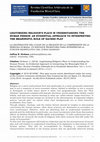Papers by Jeffrey Dickson

Religion on a more institutional level and spirituality in a more personally existential way is n... more Religion on a more institutional level and spirituality in a more personally existential way is not a respecter of socioeconomic status, limited to whether or not a country is developed, or fickle about where it takes root geographically. Even the " New Atheism " movement complies with pseudo-doctrines, proves zealous for deeply-rooted beliefs, and has even started meeting in what are called atheist " mega-churches. " It would seem that human beings are inclined to the phenomenon of organized religion and/or " sacred play " no matter what their backgrounds are or what historical localization they claim. Though religion, theology, and the claims therein should be weighty in discussions concerning the human person, often these sciences are dismissed as secondary or even unnecessary. However, more are admitting that to understand mankind in general and the individual in particular, one must incorporate what these discussions afford. As Haslina Ibrahim (2008) rightly acknowledges, " to fully understand man, it is vital that we reconcile the study of religions with other sciences that fall under the study of humanities. " To this end, this argument will build an evidential case for the pervasiveness of sacred play and call readers to understand something of its legitimacy in discussions of the human person. This will be accomplished by building a compendium of characteristics witnessed in the human person that are generally observed among

Any worldview prepared to delineate a robust view of the universe fits into one of two categories... more Any worldview prepared to delineate a robust view of the universe fits into one of two categories: theistic and non-theistic. As non-theistic arguments for phenomena such as morality (which is both a physical and spiritual consideration) become increasingly sophisticated and complex, they are harder to criticize without first admiring their skillful design and near-artistry. One such argument involves a relatively new innovation that is the child of naturalism and eastern philosophy—Neural Buddhism. As will be concluded later, Neural Buddhism might be defined as a synergistic amalgamation of naturalism and an eastern non-theist spirituality on the grounds of reason and experience that affirms the following: the impermanence of all things, a deterministic cosmology, and moral realism. Like two world-renowned designers collaborating on a new garment, Naturalism and Buddhism have come together in this distinct program to offer something inventive, especially in its explanation of moral transformation that is both a physical as well as a spiritual phenomenon. Inasmuch as it deals with the spiritual and physical together, Neural Buddhism offers a non-theistic explanation for how morality works and how individuals achieve moral maturation. However, this critical analysis, after delineating Neural Buddhism and explaining its program of moral transformation, will ultimately reveal that this non-theistic worldview is incapable of providing good answers to several compelling criticisms—criticisms that do not so easily threaten theism.
This paper will make the case that the Christological typology implemented by the New Testament w... more This paper will make the case that the Christological typology implemented by the New Testament writers, rightly understood, is not only permissible for today’s theologians and preachers, but should also be encouraged. In support of this argument, a properly nuanced delineation of typology will be presented followed by an examination of typological interpretations witnessed in the New Testament.
This investigation will demonstrate that while there are a multiplicity of types used by the prea... more This investigation will demonstrate that while there are a multiplicity of types used by the preacher in Hebrews in varying ways and in varying contexts, each type is intimately connected not only to the other types employed but to the purpose of the work as a whole. In order to achieve this conclusion, this argument will reveal the purpose of Hebrews, define typology, introduce three separate types that are present within Hebrews, and analyze the types according to their differences and similarities.
Evangelical scholarship has shown great admiration for the work of Gary Habermas and others in th... more Evangelical scholarship has shown great admiration for the work of Gary Habermas and others in their contribution to Christian apologetics by validating the historicity of the resurrection of Jesus Christ with a list of minimal facts generally agreed to by historical and biblical scholars. This thesis will explore the methodology of the minimal facts approach and
appropriate it as a tool to explore the data within the field of anthropology which offers evidence for the biblical concept of the Imago Dei. This study will focus on Wolfhart Pannenberg in his critically acclaimed work demonstrating the importance of the theological perspective is scientific anthropological studies. Here, it will be shown that data, as generally interpreted by
scholars within the field of anthropology, exists to offer significant support to the biblical concept of the image of God










Uploads
Papers by Jeffrey Dickson
appropriate it as a tool to explore the data within the field of anthropology which offers evidence for the biblical concept of the Imago Dei. This study will focus on Wolfhart Pannenberg in his critically acclaimed work demonstrating the importance of the theological perspective is scientific anthropological studies. Here, it will be shown that data, as generally interpreted by
scholars within the field of anthropology, exists to offer significant support to the biblical concept of the image of God
appropriate it as a tool to explore the data within the field of anthropology which offers evidence for the biblical concept of the Imago Dei. This study will focus on Wolfhart Pannenberg in his critically acclaimed work demonstrating the importance of the theological perspective is scientific anthropological studies. Here, it will be shown that data, as generally interpreted by
scholars within the field of anthropology, exists to offer significant support to the biblical concept of the image of God